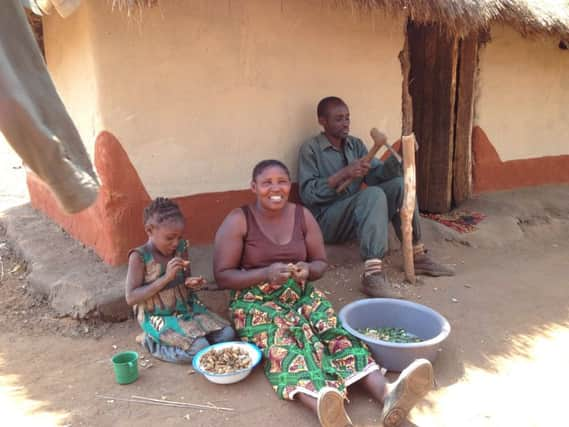Tackling chronic malnutrition in Zambia


Concern Worldwide has been trying to address this nutritional crisis for the past three years and I was invited along to see first hand how the charity’s RAIN project is tackling this issue.
The RAIN project was established in the Mumbwa district, central Zambia, in 2011 and if early indications are anything to go by, the charity’s endeavours have been a great success.
Advertisement
Hide AdAdvertisement
Hide AdQuite simply RAIN - Realigning Agriculture to Improve Nutrition - aims to prevent child and maternal malnutrition among poor rural communties.


Working with Zambia’s health and agriculture ministries, the project has been primarily set up to tackle chronic under-nutrition as well as looking at how agriculture and gender equality can help address nutritional needs.
Speaking to Danielle Harvey, Concern Country Director for Zambia, it’s clear that if you can improve nutrition from an early age, it can make all the difference in a child’s development.
“If we can make those changes before a child reaches two, it can make all the difference,” Danielle said.
Advertisement
Hide AdAdvertisement
Hide AdShe added: “If you can produce food rich in nutrients, and eat that food all year round, it can improve the nutrition of both mother and child.”
The project aims to educate local women on growing nutritious food, something they wouldn’t normally have a say over as this has been primarily the man’s decision.
Rural farmers are more likely to grow maize and cotton because they pay more.
Through the RAIN project’s education programme, it is hoped that husbands will see the benefit to their family by allowing some of their land to be used to grow nutritious crops.
Advertisement
Hide AdAdvertisement
Hide AdRAIN is supporting families to diversify the food they grow in their homesteads and to rear small livestock such as goats and chickens.
So far there are 180 small model farms or homestead gardens in the Mumbwa district, with 4,500 people benefitting from the scheme.
While most men were initially sceptical of the concept, there are some who have came round to the idea and are now reaping the rewards.
Shadreck Hanga’ndo and his wife Mainess Munamalambo, from Muchena village, established their homestead garden three months ago.
Advertisement
Hide AdAdvertisement
Hide AdGoing from growing maize and cotton, the family homestead is flourishing with a variety of crops including spinach, tomato, onions, sweet potato, okra.
Shadreck told me: “I really enjoy working in the garden with Mainess; the whole family is involved.
“We are growing 11 crops now and there is real variety for what we eat.”
In Lungo, Brighton Mweemba and his wife Catherine have just as bountiful a homestead garden.
Advertisement
Hide AdAdvertisement
Hide AdBrighton admits that he had his doubts initially but can now see the benefits to his family.
“The family now has different food; we are eating different food everyday,” Brighton said.
He added: “We work together in our garden and our family is benefitting.”
With a diverse range of foods now being grown in their homestead gardens, many women were unsure of how to cook the produce.
Advertisement
Hide AdAdvertisement
Hide AdAs part of the project, a number of women’s groups were set up in the local villages, backed by a sterling group of community health volunteers who are helping to teach local women how to cook the new foods they are growing.
The women meet each week and learn about cooking techniques, as well as general health and wellbeing advice.
One of the community health volunteers in the Lungo village is Agnita Munyama, a 50-year-old mother-of-10 who is relishing her role.
“The success for me is when you see healthy children,” Agnita said.
Advertisement
Hide AdAdvertisement
Hide AdShe added: “It is great being able to teach women about the benefits.
“Seeing the results from this project, and seeing healthy, happy children is what makes me happy.”
Her sentiments are shared by Dr Alfred Mwiinga, who is in charge of the health clinic in Luili village, which is about an hour’s journey from Mumbwa by car.
For people living in rural Zambia, accessing health care often requires walking many miles to attend clinics.
Advertisement
Hide AdAdvertisement
Hide AdIn the Mumbwa district, while there is a hospital in the main town, there are smaller clinics, like Luili, in the outlying areas.
The Luili clinic - which services a population of over 8,000 - is benefitting from Concern Worldwide’s help through the RAIN project.
Dr Mwiinga has been with the clinic since 2004 and says he has seen a vast reduction in the number of cases of malnutrition since the RAIN project began in 2011.
As part of the project, weekly weigh-ins are held in Luili for mothers to bring their children to, with chidren’s weights being monitored and advice on nutrition provided if children are showing signs of malnutrition.
Advertisement
Hide AdAdvertisement
Hide Ad“When I started here, malnutrition cases would have been quite high,” Dr Mwiinga said.
He added: “With support from Concern, we have been educating the community on malnutrition and eating more nutritious foods.
“There has been a great reduction in the number of children with malnutrition.
“Before, on occasions there might have been as many as 25 cases; since Concern came to the area cases have started to reduce; there have maybe been four cases.”
Advertisement
Hide AdAdvertisement
Hide AdThe RAIN project will come to an end next year but it is hoped that once evaluations are carried out that it could be used a model project to be rolled out to other areas in Zambia - and even further afield.
On our visit, we met with the District Commissioner for Mumbwa district, who was full of praise for Concern’s work.
He admitted that local people needed re-educating about nutrition.
Praising Concern’s RAIN project, he commented: “I look forward to the day when the project is finished because that means the people have been re-educated about nutrition.”
Read more:
Advertisement
Hide AdAdvertisement
Hide Ad